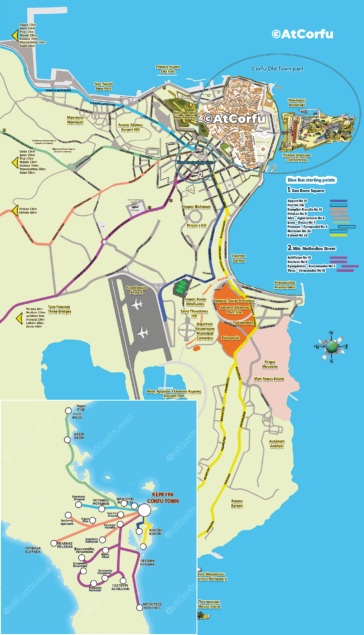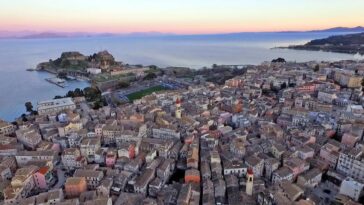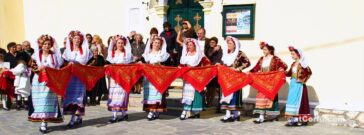Last updated on July 5th, 2025 at 02:58 pm
Weather forecast for next week in Corfu
Explore the different types of weather in Corfu that you can expect throughout the year, as well as how to plan for it. From rainy days to sunny days and everything in between, you’ll be ready for whatever Corfu throws your way!
Corfu Weather can be unpredictable, so it’s important to be prepared for whatever comes your way.
Climate and General weather patterns

The Weather in Corfu is usually mild and rainy, with a moist climate and south-to-southeast winds most of the time, the temperatures vary per month.
Corfu has a Mediterranean climate, with hot and dry summers and mild, wet winters. The average temperature in the summer months (June to August) is around 30°C (86°F), while the winter months (December to February) see temperatures ranging from 10°C (50°F) to 15°C (59°F).
Corfu receives most of its rainfall between October and April, with the wettest months being November and December. The island is generally sunny and warm throughout the year, with occasional rain showers and thunderstorms.
If you’re planning to visit Corfu, the best time to go is during the summer months when you can enjoy the island’s beaches and outdoor activities. However, if you prefer a cooler, more peaceful atmosphere, you may want to consider visiting in the spring or fall when the crowds are smaller and the weather is milder.
Temps and Weather per month
Does Corfu get cold in January?
Yes, Corfu can get cold in January. The average high temperature in January is around 14°C (57°F), while the average low temperature is around 6°C (43°F).
Additionally, the island can experience occasional rainfall and strong winds during the winter months, which can make the temperatures feel colder.
If you plan to visit Corfu in January, it’s a good idea to pack warm clothes and a jacket to stay comfortable in the cooler temperatures.
The harsh conditions can continue for the whole month up to February but sometimes the weather changes to a nice and dry period with mild north winds and plenty of Sunshine, this happens in the last 10 days of December and is a nice period called small summer or Alkionides days.
How in general is Corfu weather in February?
In general, Corfu weather in February can be cool and wet. The average high temperature is around 14°C (57°F), while the average low temperature is around 6°C (43°F).
The island can experience occasional rainfall and strong winds during February, which can make the temperatures feel colder.
However, there can also be sunny days with milder temperatures.
If you plan to visit Corfu in February, it’s a good idea to pack warm clothes and a jacket to stay comfortable in the cooler temperatures and occasional rainfall.
Overall, the weather in February is not as warm and sunny as in the summer months, but it can still be enjoyable for those who don’t mind cooler temperatures and fewer tourist crowds.
Is Corfu hot in March?
Corfu can be relatively mild in March, but it may not be considered hot by everyone. The average high temperature in March is around 16°C (61°F), while the average low temperature is around 7°C (45°F).
While the temperature may not be hot by summer standards, it can feel relatively warm after the cooler winter months.
There may still be occasional rainfall during March, but the frequency of rain decreases compared to the winter months.
Additionally, there are typically fewer tourists during March, which can make it a good time to visit if you prefer to avoid the crowds of the summer season.
Weather in April – How hot is Corfu in April?
Corfu weather in April can be quite pleasant with milder temperatures and an increasing amount of sunshine. The average high temperature in April is around 19°C (66°F), while the average low temperature is around 10°C (50°F).
The island experiences fewer rainy days compared to the winter months, but there can still be occasional showers.
Overall, the weather in April can be considered warm, but it may not be hot by summer standards.
However, it’s a great time to visit if you enjoy milder temperatures and fewer crowds. It’s a good idea to pack light layers and a jacket for cooler evenings.
Weather for May – The month that brings the Summer
May is a wonderful time to visit Corfu as it marks the beginning of summer and the weather starts to warm up. The average high temperature in May is around 24°C (75°F), while the average low temperature is around 14°C (57°F).
The island experiences a good amount of sunshine and very little rain, making it an excellent time for outdoor activities and beach days.
The sea temperature also starts to rise, making it ideal for swimming and other water sports.
May is also a great time to explore the island’s natural beauty, including the many hiking trails and scenic landscapes.
It’s a good idea to pack light and breathable clothing for warm days, but also a jacket or sweater for cooler evenings.
How hot is Corfu in June?
Corfu is typically quite hot in June, as it marks the beginning of the summer season. The average high temperature in June is around 29°C (84°F), while the average low temperature is around 18°C (64°F).
The island experiences plenty of sunshine and very little rain, making it a great time for outdoor activities and beach days.
The sea temperature is also warm and perfect for swimming and other water sports.
June is a popular time to visit Corfu, so you can expect larger crowds and higher prices, but it’s a great time to experience the island’s lively atmosphere and warm weather.
It’s a good idea to pack light and breathable clothing for the hot days, but also a light jacket or sweater for cooler nights.
How hot is Corfu in July?
July is one of the hottest months in Corfu, with temperatures ranging from an average high of 31°C (88°F) to an average low of 21°C (70°F).
The island experiences plenty of sunshine, but it can also be quite humid during this time of year.
While rain is not very common, there may be occasional thunderstorms.
July is one of the busiest months in Corfu, so you can expect large crowds and higher prices. However, it’s a great time to enjoy the island’s warm weather, stunning beaches, and vibrant nightlife.
Bring sunscreen and a hat to protect yourself from the strong sun.
August Weather is hot and the island is packed with tourists
August is one of the hottest and busiest months in Corfu, with temperatures ranging from an average high of 32°C (90°F) to an average low of 22°C (72°F).
The island experiences plenty of sunshine and very little rain, making it ideal for beach days and outdoor activities. However, the heat and humidity can be intense, so it’s important to stay hydrated and take breaks in the shade during the hottest parts of the day.
August is peak tourist season in Corfu, so the island can be quite crowded and prices can be high.
However, it’s also a great time to experience the island’s lively atmosphere, vibrant nightlife, and beautiful beaches.
Also bring sunscreen, a hat, and plenty of water.
Is Corfu warm in September?
Yes, Corfu is generally warm in September, although it’s not as hot as it is in July and August.
The average high temperature in September is around 28°C (82°F), while the average low temperature is around 18°C (64°F).
The island experiences plenty of sunshine and very little rain, making it a great time to visit for those who prefer milder weather and fewer crowds.
September is also a good time to enjoy outdoor activities such as hiking, sightseeing, and water sports, without the intense heat of the peak summer months.
For September also pack a light jacket or sweater for cooler evenings.
Does it rain a lot in Corfu? Is Corfu still hot in October?
Corfu does not receive a lot of rainfall overall, but there is some precipitation throughout the year, with the wettest months being November and December. However, during the summer months (June-August), rain is very rare, and the island experiences plenty of sunshine and hot weather.
In October, the weather in Corfu begins to cool down, but it is still generally warm with an average high temperature of around 23°C (73°F) and an average low temperature of around 14°C (57°F).
The island experiences less sunshine than during the summer months, but there are still plenty of sunny days.
There may also be occasional rainfall and cooler evenings, so it’s a good idea to pack some light layers and a raincoat just in case.
Despite the cooler temperatures, October can still be a good time to visit Corfu for those who prefer fewer crowds and lower prices.
November: What is the wettest month in Corfu?
November is one of the wettest months in Corfu, along with December and January. During November, the island experiences an average of 190mm of rainfall, which is higher than most of the other months in the year. It’s also cooler than the summer months, with an average high temperature of around 18°C (64°F) and an average low temperature of around 10°C (50°F).
November is considered the start of the off-season in Corfu, and tourism begins to slow down. However, there are still plenty of things to see and do on the island, such as exploring historic sites, tasting local cuisine, and enjoying the autumn colors in the countryside. Visitors should be prepared for cooler and wetter weather during this time, so it’s a good idea to pack warm clothing and rain gear.
Weather in December – The winter is here
December is one of the coldest and wettest months in Corfu. The island experiences an average of 230mm of rainfall during December, which is higher than any other month in the year. The average high temperature is around 15°C (59°F), and the average low temperature is around 7°C (45°F). However, it’s worth noting that temperatures can sometimes drop below freezing in the mountainous areas of the island.
While the weather may not be ideal for outdoor activities, there are still many things to do in Corfu during December. Visitors can explore the island’s historic sites, enjoy the local cuisine, and experience the festive atmosphere of Christmas and New Year’s Eve. It’s a good idea to pack warm clothing and rain gear, as well as a jacket or coat for cooler evenings.

Where to find a reliable Corfu weather forecast?
We have a weather forecast above but there are several more sources where you can find reliable Corfu weather forecasts, including:
- The National Observatory of Athens: This is a reliable source for weather forecasts and climate data for all of Greece, including Corfu.
- The Hellenic National Meteorological Service: The Hellenic National Meteorological Service is the official provider of weather forecasts and warnings for Greece. You can visit their website for current and upcoming weather conditions in Corfu.
- AccuWeather: AccuWeather is a popular weather forecasting service that provides detailed weather information for Corfu and other locations around the world. You can visit their website at https://www.accuweather.com/ for up-to-date weather forecasts.
- Weather.com: Weather.com is another popular source of weather forecasts and information. You can visit their website at https://weather.com/ for current and upcoming weather conditions in Corfu.
It’s always a good idea to check multiple sources for weather forecasts to get a more accurate picture of what to expect. Additionally, it’s important to keep in mind that weather forecasts can change quickly, so it’s a good idea to check back frequently for updates.
Summary
In conclusion, Corfu’s weather can be unpredictable, but there are a few things you can do to ensure you’re ready for whatever the island decides to throw at you.
From researching the average temperature and weather patterns to using clothing and sunscreen to be prepared, you’ll be ready for Corfu’s weather no matter what.
With these tips and tricks, you’ll be able to enjoy your time in Corfu without worrying about the weather.
More Travel info to Corfu
Corfu Blue Bus Routes Map (PDF)
Download this free, full-size PDF map of the Blue Bus route network, featuring all routes, major stops, and central pick-up points in Corfu Town.
Is Corfu Worth Visiting?
Corfu is definitely worth visiting. As one of Greece’s most beautiful islands, Corfu offers a unique blend of rich history, stunning landscapes, and cultural diversity.
Living Like a Local in Corfu: Daily Life on the Island
This guide delves into what it’s like to live like a local in Corfu, offering insights into daily routines, cultural practices, and the island’s unique charm.
Exploring Corfu’s Underwater World: Spots for Snorkeling and Diving
Corfu offers some of the best snorkeling and diving spots in Greece, with crystal-clear waters, vibrant marine life, and intriguing underwater landscapes.
Best Activities in Corfu for Families with Children
The island’s diverse offerings ensure that families with children of all ages can have a memorable and enjoyable vacation.
Secrets of Corfu and Hidden Gems for Curious Travelers
Corfu is a wonder of an island. If you’ve never explored it, it’s high time you did. Its golden beaches along with its salty seas make Corfu one of the most explored islands in Greece.











Comments